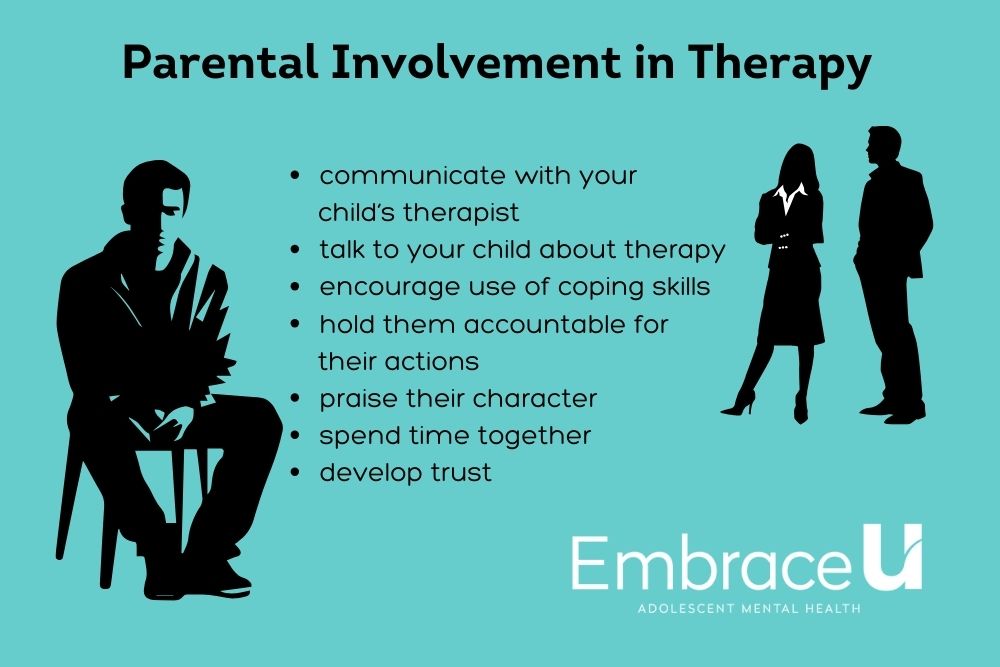Therapists who treat adolescents are often asked, “How long will it take for therapy to work?” The answer depends on several factors including a patient’s diagnosis, treatment goals, and treatment intensity. The amount of therapy sessions needed before a child or teen experiences a significant decrease in symptoms varies. Of course, parents, their children, and therapists want to see progress as soon as possible.
The American Psychology Association recently published four findings related to treatment length in cases of post-traumatic stress disorder.
- 20 to 30 therapy sessions over six months may achieve complete symptom remission and help patients feel confident in the skills needed to maintain treatment gains.
- 15 to 20 therapy sessions are required for 50% of patients to recover from a mental disorder.
- 12 to 16 weekly sessions result in clinically significant improvement.
- People with co-occurring conditions or certain personality difficulties may require longer treatment (12-18 months).
A study of 2,634 therapy patients conducted by researchers in Europe found that more frequent and longer therapy sessions, such as those found in an intensive outpatient program, appear to not only decrease a patient’s symptoms and suffering faster but might also reduce their length of treatment and health care costs. The goals of treatment, duration, and frequency should be discussed by the therapist, the parent, and the child receiving treatment. Once a potential length of treatment is established parents and therapists need to have open and honest discussions about a child’s symptoms and progress.
Parental Involvement Impacts Treatment
We talked with four Middle Tennessee therapists about the length of treatment for adolescents who are experiencing a mental health challenge. They all agreed, that there’s no such thing as a one-size-fits-all approach. Each child, each family, and each diagnosis are unique. A common sentiment among these therapists is that parents play a big role in how quickly a child’s symptoms will improve.
“Parents need to understand that therapy is not a magic wand,” said Rebecca Stewart, LCSW, a therapist at Embrace U. “Therapy is an introduction to alternative ideas of potential behaviors and thoughts that need reinforcement at home. The work of therapy is completed at home by creating an environment that is conducive to change.”
“We expect parental involvement,” said Lydia Thompson, LPC-MHSP, counselor and founder of Concord Family Counseling. “It’s necessary. The therapy process takes place 24 hours a day, seven days a week. So a therapist is not there all the time. Sometimes we notice that parents, not purposefully, aren’t creating the safe place that their child needs. I would expect the parent would listen to the feedback that we have about how they can help their teenager and shift their behaviors. Their child is going to be doing hard work in therapy to change their behaviors. I would hope that their safe adult would also do things.”
“Parents have a big role to play in their child’s therapy,” said Rachel Holloway, MS, LPC-MHSP, a therapist at Embrace U. “Therapy is about the whole family, and parents being willing to make changes at home positively impacts outcomes. We often see parents who accommodate their child’s symptoms with the best of intentions. It can look like allowing their child to miss school, decreasing chore responsibilities, or allowing them to avoid everyday experiences that make them feel uncomfortable. In an effort to have their child feel less pain and discomfort, parents end up creating a bigger mental health problem. Therapy takes time and effort, and motivation plays a big role in the outcome. It is not an overnight solution, and it needs parent involvement.”

What to Expect With Teen Therapy
Trust plays a key role when it comes to making real progress with a child or teen in therapy. A therapist needs time to develop a rapport with an adolescent. Developing the level of trust needed for an adolescent to open up about their struggles may require more frequent sessions in the first few weeks or months.
“That can take anywhere from four to eight sessions,” said Christine Finnegan, founder and clinical director of Replenish Her Counseling. “So there’s this foundation that has to get built before we can start to integrate change and tools. It’s so important that the teen is coming weekly, and that we’re not putting huge periods of time between sessions, because if they have anxiety then those weeks in between a session and anticipation of the next appointment are going to build more anxiety and often times a teen can talk themselves out of therapy. So there has to be this momentum at the beginning where the teen is really getting to know the therapist and there’s a relationship being formed.
“From there you can start to see change happen because you have to have that security as your foundation and base in therapy before you can really help a teenager get into their discomfort and lean into the areas they need help and growth in. Then change can happen.”
“It sometimes takes longer than what parents are hoping for,” Thompson said. “Especially working with teenagers. It takes a little while to earn their trust. Sometimes teenagers view me as just another adult who’s going to tell them what to do, who’s going to judge them and criticize them when really we are operating on a completely different plane than all of the other adults in their lives.”
Setting expectations with parents and their children about how therapy works and how long it might take for symptom reduction to occur is paramount. It’s not uncommon for parents to bring their children to therapy when they feel like they have nowhere else to turn, and expect unrealistic results.
“Sometimes we see a kind of survival instinct in parents,” Finnegan said. “They come in saying, ‘I need this to stop. I need relief. I can’t handle anymore of this.’ And so a lot of our approach is looking at the full family system because the parents that have an unrealistic expectation, most of the time, need support and care themselves.”
About Embrace U
Embrace U offers two adolescent therapy programs – intensive outpatient and partial hospitalization. Both programs combine psychiatry with group and individual therapy. These programs are designed to help participants and their families quickly identify the root causes of mental health challenges and develop coping and communication skills to recover from them. Our clinical team works with families to create realistic treatment goals. Our therapists keep parents informed every step of the way. Schedule a free clinical consultation today or call us at 615-656-8624.










